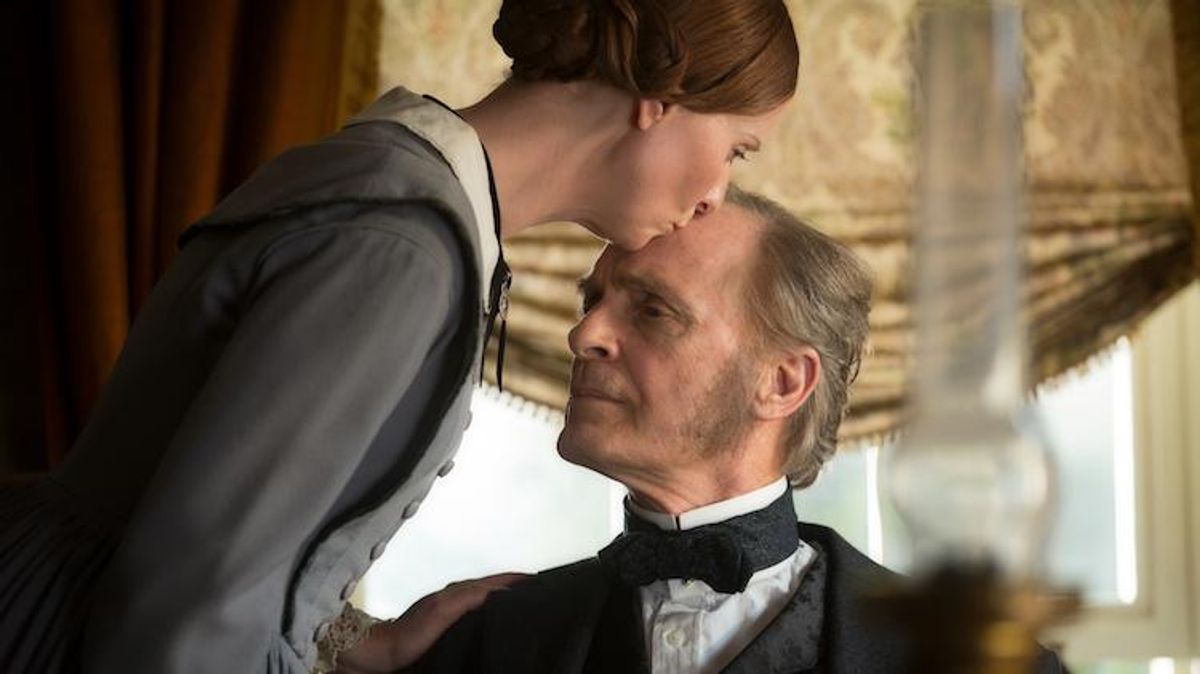
Why Terence Davies’ Emily Dickinson biopic surpasses other movies.
April 17 2017 12:59 PM EST
May 31 2023 6:34 PM EST
By continuing to use our site, you agree to our Private Policy and Terms of Use.

Why Terence Davies’ Emily Dickinson biopic surpasses other movies.
All the best filmmakers are gay. That's been a fact for the past few years, even though critics polls saying otherwise are, predictably, unreliable.
The latest proof is A Quiet Passion, the new film by Terence Davies. Its subject is the great American poet Emily Dickinson and out British filmmaker Davies looks inside her emotional life, identifying with her isolation, dissatisfaction, her introverted romantic longing, the misunderstanding and anonymity that she suffered which was only relieved by her artistic dedication.
Related | Cynthia Nixon on Emily Dickinson's Sexuality & Her Own
The film's intensity stands out in this era of trashy movie escapism that gay film fans sometimes turn to camp; they assert cultural defiance as an exercise of social defense.
But that's not the only queer response and the best recent films (Hugo & Theo, Staying Vertical, Being 17, 4 Moons, Sunset Song, Frantz, I Am Happiness on Earth, Eisenstein in Guanajuato, Beautiful Something, Will You Dance with Me, The Way He Looks) happen to be those that use a gay sensibility to vivify human experience.
Dickinson's internal life inspires a different, more intense, queer empathy. Davies delivers us from the usual vicarious enjoyment of film characters; he gets deep down into the soul of individuals.
Knowing that the universality of Dickinson's poetry comes from the truth of her personal observations and the precision of her thoughts and articulation, Davies creates a film experience that surpasses trite identity politics and restores depth to movies. This is important at a moment when pop culture--especially for LGBTQ audiences--threatens to turn into shrill propaganda.
Out actress Cynthia Nixon portrays Dickinson with a pinched rectitude goes against the sentimental "Belle of Amherst" label. Nixon's intensity makes good on her remarkable, underappreciated performance in James White. Her emotional dedication asks for the opposite of admiration. When Dickinson lambastes Longfellow to insist on "Something pressed from the truth, that is poetry," it is also Davies' defense of his own artistic integrity. A Quiet Passion insists on a serious gay cinema, that gets closers to personal, spiritual and therefore universal experience.
As Dickinson's sister, Vinnie, Jennnifer Ehle surpasses understanding with a smile: "Your anger is a defense against the world," which describes Dickinson evolving from bratty, rebellious student (a "no-hoper" as a religious teacher judges) to a philosopher caught up in existential profundity. (Dickinson other family members Keith Carradine, Joanna Bacon Duncan Duff and Jodhi May are all distinct yet haunting.)
Davies' matches Dickinson's in the beauty of his grave, expressive images. "Poems are my solace for the eternity that surrounds us" is a line that resounds in such compositions as the cross-eyed suitor Mr. Emmons (Stefan Menaul) waiting at the bottom of a staircase. These scenes of individual rejection--purely Davies--focus the struggle that is, always, felt personally before it becomes a social cause and so is all the more poignant and powerful.
"He fumbles at your spirit/ As players at the keys/ Before they drop full music on/ They stun you by degrees."
Those lines make Dickinson Davies' best critic. His emotional intimacy recalls Andre Techine's visionary film The Bronte Sisters, Alan Rudolph's Dorothy Parker bio-pic, Mrs. Parker and the Vicious Circle as well as the sense of mortality (and radical film form) that inspired Carl Dreyer's Gertrud. A Quiet Passion refuses categorization in a gay film ghetto. It ranks with the finest achievements in all of film.